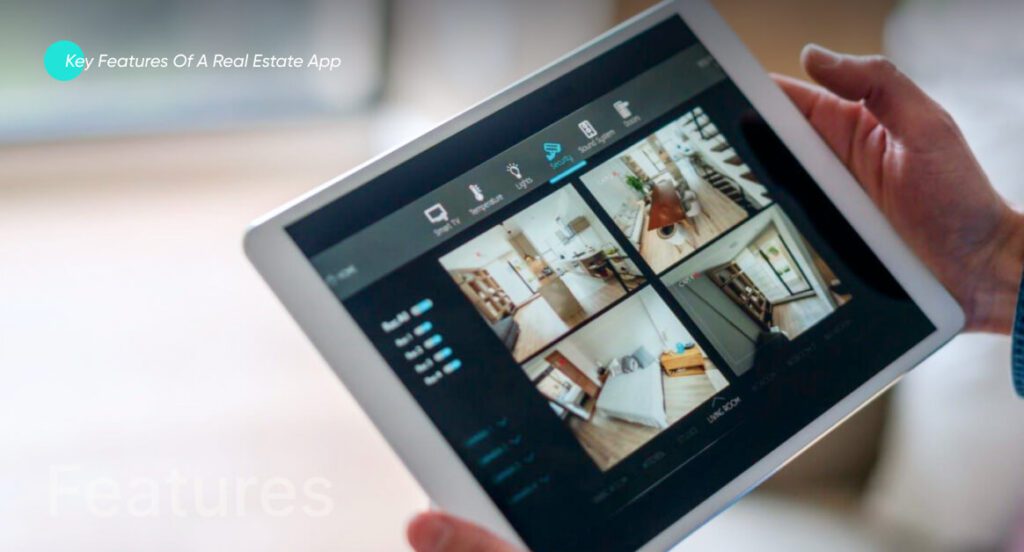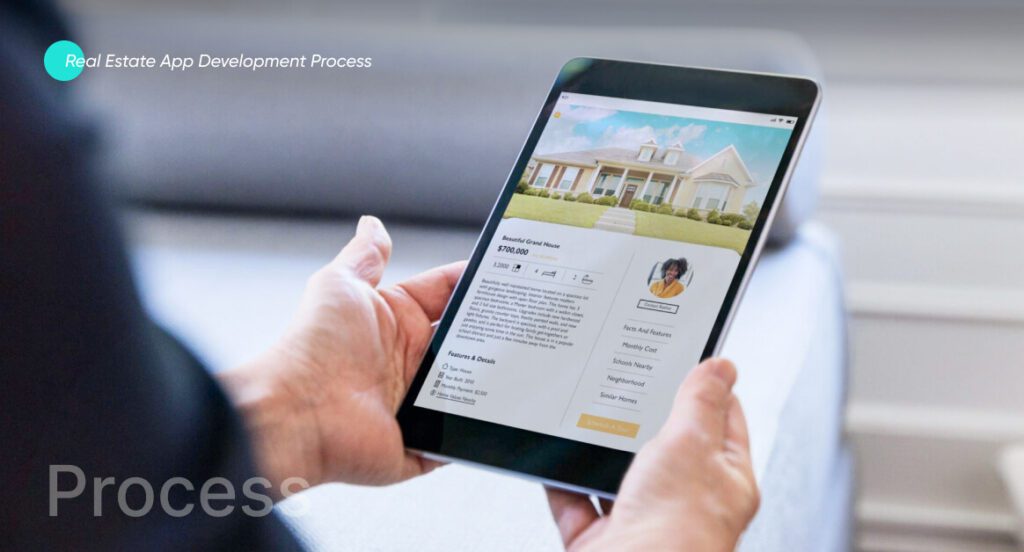Real Estate App Development: Key Factors and Consideration
Before the advent of real estate app development, the industry was constrained by tedious and time-consuming conventional methods. Prospective buyers and sellers were caught in the quagmire of visiting properties in person, flipping through thick paper listings, and enduring endless phone calls to connect with realtors. However, a transformative change came with the rise of mobile apps in the real estate market.
These technological advancements swiftly replaced the old methods, unleashing a wave of benefits. With the tap of a finger, users could now access a vast array of properties, complete with detailed descriptions, high-definition images, and immersive virtual tours, all from the convenience of their smartphones. Communication with agents became instantaneous, enabling rapid responses to inquiries and facilitating smoother transactions.
As the apps streamlined the property-hunting process, buyers and sellers were liberated from geographical constraints, allowing them to explore properties nationwide or globally. After embracing this digital revolution, the industry flourished, and individuals discovered that the power of mobile apps had truly transformed their real estate journey for the better.
The article sheds light on the real estate app development process. Read the article to know more.
Choose the top-level real estate app development company like Coding Pixel for your app project. See Our Mobile App Services ![]()
What are the Types of Real Estate Apps?

Investors, buyers, and sellers use different types of real estate apps in the market. Before commencing the real estate app development process, knowing the types of real estate apps is vital. The following are some of the most commonly used real estate apps.
1. Property Search Apps
Property search apps enable users to look for properties for sale or rent. Users can search for their properties in their preferred locations. Likewise, they can filter properties based on various criteria such as price, size, number of rooms, amenities, and more.
2. Real Estate Aggregator Apps
Aggregator apps gather property listings from various sources and display them in a single platform. They help users access different real estate options from multiple websites and agents.
3. Real Estate Marketplace Apps
These apps function as online marketplaces where property buyers and sellers can interact directly. Users can list their properties for sale, or buyers can directly approach the property owners. Landlords and property managers mainly use these apps and are adept at managing tasks. These apps help with tenant management, rent collection, maintenance requests, and tracking expenses.
4. Mortgage Calculator Apps
Mortgage calculators help potential buyers estimate their monthly mortgage payments based on the loan amount, interest rate, and term.
5. Real Investment Apps
These apps facilitate investors looking to analyze potential investment opportunities, calculate returns, and manage their real estate portfolios.
6. Virtual Tour Apps
Virtual tour apps offer 360-degree views of properties, allowing users to explore homes remotely without needing a physical tour.
7. Home Valuation Apps
These apps estimate a property’s market value based on recent sales data and other factors.
8. Vicinity Information Apps
Users can access data about a neighborhood’s demographics, crime rates, school ratings, amenities, and local points of interest.
9. Real Estate News Apps
Apps provide real estate news, market trends, and industry insights to inform users about the latest developments.
15 Key Features of Real Estate Apps

Real estate apps offer users various features, including buying, selling, renting, or managing real estate. To initiate the real estate app development process, you should know about the standard features of real estate apps. Here are some of the standard features found in real estate apps.
1. Property Listings
Real estate apps act as a consolidated platform to display property listings. Users can browse various properties based on their preferences, such as location, price, size, and type.
2. Search Filters
Ensure that your real estate app boasts structured and effective search filters that allow users to narrow their property search according to specific criteria. You can include filters such as location, property type, price, number of bedrooms, bathrooms, amenities, and other relevant factors.
3. High-quality Images
Before starting the real estate mobile app development process, you should know that one feature of real estate apps includes providing high-resolution images of properties that offer users an engaging and better viewing experience and a more accurate representation of the property.
4. Property Details
Detailed information about each property is crucial for potential buyers or renters. It includes property specifications, features, nearby amenities, schools, public, and transport.
5. Virtual Tours
Given the tough competition, a virtual tours feature will enable realtors to stand out. Moreover, clients can view their preferred properties remotely and without the inconvenience of physical visits.
6. Map Integration
Integrating maps into the app helps users visualize the property’s location and neighborhood. There is no need for app owners to create their maps. Contrarily, you can integrate map solutions from third-party providers like Google Maps.
7. Save Search and Favorites
Users can save properties they are interested in as favorites, allowing them to revisit and compare later. It is an excellent feature to retain users.
8. Push Notifications
Push notifications are commonly used in real estate app development. They inform users about crucial information. The app can send users real-time notifications about new listings, price changes, open houses, and other updates related to their saved searches. Users can set up alerts based on their criteria, and the app will notify them when a property meeting their requirements becomes available.
9. Mortgage Calculator
Many real estate apps offer a mortgage calculator to help users estimate their monthly mortgage payments based on the property cost, down payment, interest rate, and insurance.
10. Agent/Broker Contact
Users can contact real estate agents or brokers through the app for inquiries or assistance.
11. User Profiles
Creating user profiles allows users to create and manage profiles. Users can also save contact details, property preferences, and viewing history.
12. Reviews and Ratings
Users can provide feedback, reviews, and ratings for agents, brokers, and properties, which can assist others in making insightful decisions.
13. Chat Options
Realtors must maintain smooth and effective communication to help clients with questions and assistance. A messaging system allows users to communicate directly with agents, brokers, or property owners without leaving the app.
14. Secure Payments
Secure payment gateways are crucial for real estate apps that facilitate property purchases or rentals to protect users’ financial information.
15. Augmented Reality (AR)
During the real estate app development process, you should consider adding AR features in your app. It will help buyers visualize their preferred properties’ wall colors, furniture, and interior designs in various vibrant colors. Consequently, it will allow buyers to make informed decisions and help sellers sell their properties relatively quickly.
Real Estate App Development Process

Real estate mobile app development entails a methodical process with five crucial stages. Here are the five critical stages required for real estate app development.
1. Planning and Research
Define your objectives and clearly outline the goals of your app. Additionally, identify your target audience and comprehend their requirements and pain points. You should scrutinize your competitors by evaluating their strengths and weaknesses. Subsequently, create a substantial list of features for your real estate app. Choose an adequate technology stack for the app, considering factors like platform (iOS, Android, or both), database, backend framework, and any additional tools or libraries required.
2. Design and User Experience (UX)
In the second stage, you must create wireframes to visualize the app’s layout, navigation, and overall structure. You should also develop the app’s visually captivating user interface (UI) design and ensure its alignment with its branding. In addition, focus on creating a responsive and user-friendly user experience (UX) design, allowing easy and smooth navigation and access.
3. Development
It is the most crucial step in the real estate app development process. Here, you must concentrate on frontend development, apply UI/UX design, and create the app’s frontend. It can include the user interface, search filters, and property listings. For the backend development, you will establish the server-side infrastructure, database, and APIs for data storage and retrieval. At this stage, you must also integrate third-party services such as APIs for location-based features, virtual tour providers, and payment gateway for secure transactions.
4. Testing and Quality Assurance
Constantly conduct testing throughout development to identify and fix bugs and issues. Additionally, you must perform various types of testing, including functional, compatibility, performance, and security testing, to ensure that the real estate mobile runs smoothly and efficiently.
5. Deployment and Launch
In the last stage, you will release a beta version of the app to limited users to collect their feedback and fix any persistent issues. Similarly, adhere to their guidelines to prepare the app for submission to respective app stores (Apple Store and Google Play Store). After the app is live in app stores, consistently monitor its performance, offer updates, and improve the app following user feedback.
The Benefits of Real Estate Apps

Real estate apps provide many benefits while ensuring buyers, sellers, and agents’ convenience, efficiency, and security. Before starting the real estate app development process, you must assess the benefits of the real estate apps. Here are the key benefits of real estate mobile apps.
1. Property Database Access
Real estate apps provide users access to an extensive database of property listings from various locations and types. This comprehensive range of options allows users to find properties that suit their preferences and budget.
2. Convenience
Using real estate apps, users can search for properties, view images, and gather information at their convenience, 24/7. It can save considerable time as users can browse properties on their mobile devices without visiting real estate agents in person.
3. Advanced Search and Filters
Real estate apps offer broader search and filtering options, allowing users to refine their property search based on exact criteria such as location, price range, property type, and more. It helps users find properties swiftly and follow their requirements.
4. Interactive Maps
Interactive maps allow users to visualize property locations and nearby amenities. This functionality provides valuable insights into the neighborhood and accessibility to transportation, schools, and other essential facilities.
5. Virtual Tours and Quality Images
Real estate apps often come with virtual tours and the finest images of properties. This delightful virtual experience enables users to explore the property, enhancing their understanding of its layout and features.
6. Seamless Communication
Real estate apps also provide quick and direct communication between users and real estate agents or property owners. This feature lets users inquire about properties, schedule viewings, and receive real-time messages.
7. Market Insights and Trends
Some apps may also provide market analysis and trends, providing users with crucial information about property prices, demand, and other market factors. It allows users to make informed decisions and grab promising opportunities.
8. Secure Transactions
Real estate apps that facilitate property transactions use secure payment gateways and encryption to protect users’ financial information. It reinforces transparency and security, which boosts users’ confidence in using the app.
Leverage our real estate app development services. Don’t miss out on the opportunity to revolutionize your business – contact us today!
FAQ
The final cost of the real estate app development depends on various factors, such as the app’s features, functionality, design elements, platform selection, backend infrastructure, and the development team’s fees. The estimated cost of developing a real estate app can range from $35,000 to $160,000.
The key challenges faced during the real estate app development process include integrating vast amounts of real-time property data and ensuring a user-friendly interface with responsive search features while tackling platform compatibility and performance optimization.
The development timeframe for a real estate app can vary based on its complexity, features, and the development team’s expertise. Generally, the time to develop a real estate app can take anywhere from a few months to a year to develop.
Whether to develop for iOS, Android, or both platforms depends on your target audience and budget. Designing for both platforms can reach a broader user base, but it may require more time and resources. Consider market share, user preferences, and app development costs before deciding.
Gohar is a seasoned IT writer specializing in leading technologies. He holds a Diploma and Bachelor's degree from the University of London, with professional experience spanning over five years in the IT sector. His expertise involves a keen focus on mobile applications, web apps, blockchain, content management systems, e-commerce, and fintech. Beyond the professional field, Gohar is an avid reader and reads extensively about emerging and innovative technologies.